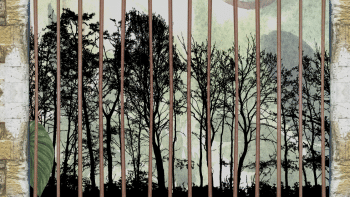Stop the onslaught on Chunati Wildlife Sanctuary

A report in this paper has revealed a most horrendous example of how administrative power is abused to destroy precious hillocks in Chunati Wildlife Sanctuary in Chattogram to grab the logs and sand. None other than a local union parishad chairman, along with his henchmen, have been plundering these hillocks, with the Forest Department and local administration doing absolutely nothing to stop them.
The blatant manner in which the trees have been cut and sand have been extracted, with a temporary road being cut through the forest to transport the loot, is enough proof of the level of impunity this syndicate enjoys. It is ironic, not to mention, tragic, that this sanctuary, built in 1986, was a major corridor through which the now endangered Asian elephants used to travel. Built for the protection of wildlife and natural resources, it was supposed to be overseen by the Chattogram Divisional Forest Office.
So what happened over the years? How could a public official and his cronies carry out such a huge scale of devastation without the knowledge of the Forest Department? A resident of the area quoted in the report said that trucks have been taking away sand, earth and trees every day. With so much activity going on, it is hard to understand how forest department officials could be oblivious of this for so many years.
It is hardly a surprise that the sanctuary, which consists of 7763.4 acres of forest land, is being eyed by greedy encroachers. But that a public official has been involved in this crime, with no effective action from the very department that is responsible for the forest's protection and conservation, is appalling.
Bangladesh is considered a champion of environmental causes worldwide. But the way it has allowed precious natural resources to be depleted and destroyed by individuals and groups connected to power makes us wonder about the commitment of the government in protecting its own environment and wildlife. This includes the Local Government Engineering Department (LGED) plans to build a road right through Ramu reserve forest, which would involve felling thousands of trees. Last July, the government handed over 20 acres of the same reserve forest to the Bangladesh Football Federation (BFF) for building a residential training facility. These are only a few examples among innumerable ones.
Over the decades, forest cover has been reduced to 17 percent of the country's total area. Apart from being devastating for the wildlife that live in these forests, the loss of forest cover makes the country more vulnerable to cyclones and other natural disasters. We urge the government to wake up and put an immediate stop to these continuous onslaughts on forest areas. It must first identify and penalise all those departments, groups and individuals that are part of this crime and, in the process, recover these precious forests, including the Chunati Wildlife Sanctuary.

 For all latest news, follow The Daily Star's Google News channel.
For all latest news, follow The Daily Star's Google News channel. 







Comments